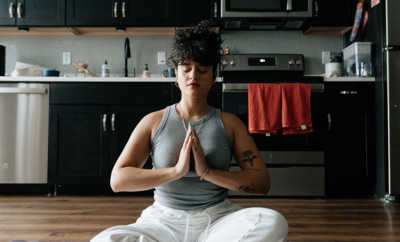10 Practical Tips to Express Your Sexual Desires to Your Partner

While the act of sex can be a fun, exciting and connecting experience, having a conversation about it can be incredibly intimidating. Talking about sex requires a level of vulnerability and sensitivity many of us are not experienced with.
Humans generally feel much more vulnerable talking about sex than having sex. Frank communication requires a different sort of openness that can be wrought with fear and shame for many people.
Talking about sex can be a great way to build communication skills between you and your partner.
The good news is, with some forethought and preparation, talking about sex doesn’t have to be scary and intimidating. In addition, talking about sex can be a great way to build communication skills between you and your partner.
It likely will be awkward at first, but opening up about your desires and needs can truly transform your relationship.
When to Talk About Sex
Honestly, it is never a bad time to start talking about sex with your partner. The longer into your relationship you wait to start talking about sex, the harder it will be to start.
Author and academic, Justin Lehmiller suggests you establish intimacy and trust by starting with easier conversations first, like consent or contraception. That will make later conversations about what feels good and what doesn’t, easier.
All being said, it is never too late to start talking about sex with your partner. Communication can be difficult for anyone and everyone. We are not all raised to communicate with the same level of vulnerability and intimacy.
Your sexual needs and desires will continue to shift and evolve as you grow, learn and experience new things.
It is important to remember intimate conversations aren’t just about pleasure. Other topics about sex can include:
- Sexual health
- How frequently you’d like to have sex
- Desire to try something new
- Change in libido
- Lack of intimacy or need for more affection
- How to deal with differences in what you and your partners enjoy
Beyond Sex: Explore These 12 Types of Intimacy With Your Partner
Having open conversations about these topics will also help build a strong foundation as these conversations will help you learn about each other and explore new things together, all while being on the same page.
It is important to note sex isn’t a topic you should talk about only once. Your needs and desires will continue to shift and evolve as you grow, learn and experience new things.
It will be easier to share changes and experiences with your partner as they come up if you keep lines of communication open.
Let’s Talk About Sex! 10 Tips to Express Your Sexual Desires:
Read on for ten practical tips on talking to your partner about sex.

1. Don’t Surprise Your Partner – Timing Is Everything
Starting a conversation about sex when your partner just got home from a stressful day at work, is not a good time. Ever. Anytime you want to have an important discussion it is vital to find a time when you’re both feeling well and in a good mental state.
In fact, it can be really useful to let your partner know twenty-four hours ahead of time that you would like to have a conversation about *insert specific topic here*. This gives your partner time to think about the topic and how they feel about it.
It also allows time for any emotional triggers that may have arisen just from hearing you want to talk about a particular subject. It is impossible to have a logical conversation if you or your partner are emotionally triggered.
A good way to phrase it could look like this: “I would love to talk about how we might explore our sexual desires and fantasies in a way that is safe and comfortable for us both. Could we talk about it over coffee on Saturday morning?”
2. Don’t Complain, Make Suggestions
By complaining to your partner about their sexual performance, you not only risk hurting them, but ruin the opportunity to have an open and honest conversation. Starting with negativity will make it very difficult for your partner to be vulnerable with you.
It is important to help make your partner feel safe at the start of the conversation. Start by giving your partner some reassurance by commenting on things you find positive about your sex life. For example, “I really love how we cuddle before sex.”
Once you’ve shared a positive, then you can suggest what you are desiring. For example, “Other times, I long for more intensity.” It can be helpful to follow-up that suggestion with a specific example, such as, “I think it would be really sexy if you pulled my hair.”
Next, it is important to let your partner know you value and appreciate their point of view by opening the discussion. You could say, “What do you love about our sex life and what do you wish were different?”
3. Be Open About Your Fantasies
The idea of speaking openly about your sexual fantasies, even with your partner, can bring up feelings of shame and fear. Know you’re not alone. Many people never share their sexual fantasies with anyone.
The problem with keeping your fantasies bottled up inside of you is you miss out on the opportunity to experience new things…things that could bring you a lot of joy and pleasure. Even worse, you miss out on an opportunity to develop a greater sense of intimacy and connection with your partner.
The Madonna Whore Complex: How to Shamelessly Embrace Your Sexuality (According to a Sex Coach)
In the end, there really isn’t a reason to feel shame or fear over your fantasies. It is quite likely your partner has the same or similar fantasies. Humans are not as different as we sometimes think ourselves to be.
According to the research Justin Lehmiller did for his book Tell Me What You Want, 97% of all sexual fantasies fall into seven broad categories: multi-parter sex, rough sex, novelty and adventure, voyeurism and fetishes, non-monogamous sex, deeper emotional connection and gender fluidity.
4. Listen Well
In any conversation you have with your partner it is important to truly listen to your partner. This requires you to stop the monologue running through your mind and stop thinking about how you’re going to respond.
You can’t actively listen and truly hear them if you’re stuck in your head. It is ok if you don’t know how to respond the second they stop speaking. Pause, think about what you want to say, and then respond. When you’re not thinking while you’re listening, you’ll actually hear so much more.
5. Use I Statements
When you talk about sex, you are talking about sensitive, emotionally triggering topics, and it can be easy to place blame on your partner for how you are feeling.
For example, if someone is feeling jealous because their partner expressed attraction to another person, one might say, “You made me feel jealous.”
The fact is though, no one can make you feel anything. When you have an emotional response to another’s actions or words, those emotions are yours and it is not the “fault” of anyone you feel that way.
Up Your Communication Game: 5 Tips to Turn a Confrontation Into a Win-Win Conversation
When you own your emotions, it allows for you to look below the surface and figure out why you feel the way you do. In the example above, it is possible this person felt jealous because of underlying insecurity or abandonment issues.
Some examples of good “I” statements to use when you talk about sex are:
- “When you expressed attraction for that other person, I felt jealous and triggered. Would you sit with me and help me talk through my feelings?”
- “I really liked it when you were on top of me during sex. Is there anything I can do to get more of that?”
- “I notice we seem to be having less foreplay before we have sex. Can we talk about ways to spend more time making out first?”
By removing the blame from your statements, you take the charge and sting out of your words. This will keep the conversation focused on the issue at hand.
6. Be Clear and Explain
It is important to be clear when you talk about sex. It reduces the risk of miscommunication and hurt feelings. As humans, it is natural to forget we each have a different perspective and, thus, we often misunderstand each other. Even when we are listening well and staying present.
Similarly, sometimes, it can feel like we are over-explaining ourselves if we give more than a yes or no answer. However, when talking about sex with your partner – especially early in a relationship – it can be useful to give a little more information than you normally would to avoid misunderstandings.
For example, if you partner asks if you want to have sex right now and you just finished cleaning the bathroom and feel dirty, say that. It helps your partner to understand the no has nothing to do with them. Don’t assume they know what is in your thoughts.

7. Talk About Your Expectations
Unspoken expectations can lead to frustration, anger and resentment.
For example, if you expect your partner to always initiate sex, it is important he knows. Otherwise, you may spend weeks, months or years wondering why your partner doesn’t want sex with you more often. Meanwhile, he is wondering the same thing.
It can be really useful to talk about your expectations around sex and sexuality with your partner so you are both on the same page. According to Laurie Watson, a licensed sex therapist and author, the questions below are a great way to get a better understanding of each other’s expectations.
- What time of day do you feel most sexual?
- In your mind, does seduction belong to one gender?
- Do you like sexual initiation to begin with touch or words?
- How often do you like sexual contact in one week?
- What moods, rhythms and acts during sex turn you on?
8. Pick 1 Topic Per Conversation
While it may seem like a good idea to bring up all your issues at once, doing so could be overwhelming to your partner. Discussions about sex and sexuality can be complex and bring up emotional issues that are hard to work through.
For example, Marie wishes Jack would initiate sex more often. She worries he may not find her as attractive as he used to since her body shape and size has changed since she started working a desk job. She is also concerned her request for more oral sex last year may have put him off.
There are three distinct topics for conversation in this example.
One, the initiation of sex. Two, her concern over physical attraction. Three, the topic of oral sex. While all three topics could be discussed at once, it likely would make for a productive conversation to tackle them individually.
9. Use Movies to Start Conversations and Explore
Sometimes tools are useful to help start an uncomfortable conversation. Movies can be a great tool to start talking about sexual needs and desires with your partner.
For example, if you’re interested in trying something new or kinky, a great way to bring the topic up is to watch a movie together that features it. While you’re watching the movie, ask questions to get a sense of how your partner feels about it.
You could ask questions such as, “Did you think that was sexy?” or “Would you be interested in trying something like that?”
Keep in mind the focus of these conversations should be curiosity and openness. If your partner discloses they are interested in something you find off-putting, respond with kindness. Saying something like, “That’s gross!” isn’t appropriate and will hurt your partner and your relationship.
10. Use Checklists
Checklists are another tool you can use as a conversation starter with your partner when you want to talk about sex. Checklists provide you with a wide variety of topics and ideas within the realm of sex and sexuality.
It is suggested you and your partner complete a checklist individually and then sit down together to go over your results. Many checklists offer talking points within each category to help focus the conversation.
Here are two organized and useful checklists to help you talk about sex. The first is from AskingForWhatYouWant.com which is owned and operated by Marcia Baczynski, a sex and relationship educator.
This checklist provides several main topics within sex and sexuality, such as, masturbation, virtual sex, oral sex, basic positions, location, sex toys, communication, wardrobe and more. There are also sample questions for discussion within each category.
You can find a PDF copy of her Sexual Interests Checklist here.
The other checklist is from Scarleteen.com, an organization dedicated to inclusive and comprehensive sex and sexuality education. This checklist is similar to the one above; however, it also includes checklist items on topics such as body boundaries, safety, relationship models and sexual response.
You can find the Scarleteen checklist in PDF format here.
Talking About Sex Doesn’t Have to Be Scary
Engaging in regular communication is a vital component to any healthy relationship. This includes sex! You should talk with your partner about sex on a frequent basis. It isn’t a topic only for new couples, it is a conversation that should continue throughout your relationship.
Engaging in regular communication about sex is a vital component to any healthy relationship.
Despite what our culture tries to tell us, we are not born with unending knowledge about everyone’s sexual needs and desires. Learning what your partner enjoys and doesn’t requires communication. Furthermore, we change continually, so keeping the conversation going is important.
Having a healthy sex life is a treasure. One that needs to be nurtured frequently.




























Comments